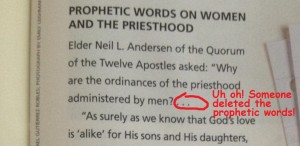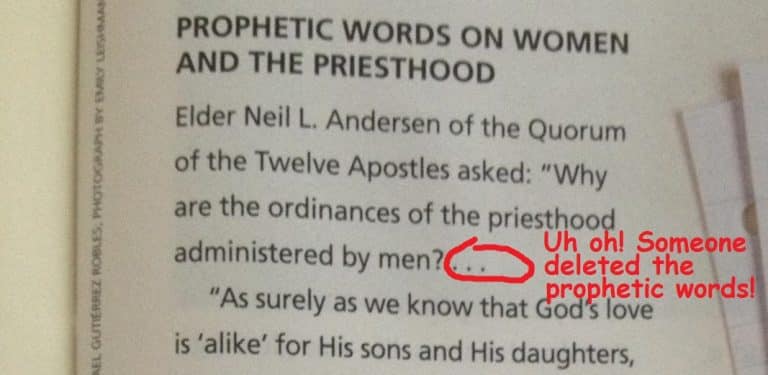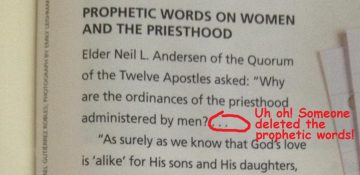 What is the most important information to glean from a conference talk by an apostle? Is it what he actually said or is it information that he excluded from the talk? Which part of the talk should we focus on–the talk’s thesis statement or the talk’s endnotes? And what can you do if you don’t like a talk by an apostle? Maybe you think that he should have said something else? Can you just go ahead and rewrite the talk? And if you want to critique an apostle’s talk, is it necessary to sign your name? Is it okay to hide your critique in an official church publication and pretend that you’re just summarizing the talk, not critiquing it?
What is the most important information to glean from a conference talk by an apostle? Is it what he actually said or is it information that he excluded from the talk? Which part of the talk should we focus on–the talk’s thesis statement or the talk’s endnotes? And what can you do if you don’t like a talk by an apostle? Maybe you think that he should have said something else? Can you just go ahead and rewrite the talk? And if you want to critique an apostle’s talk, is it necessary to sign your name? Is it okay to hide your critique in an official church publication and pretend that you’re just summarizing the talk, not critiquing it?
An anonymous staff person at the Ensign answers all of these questions with a new series titled, October 2013 Conference Notebook, in which he/she takes talks from General Conference that he/she apparently did not approve of, deletes out the objectionable parts, and replaces them with items from the endnotes that the anonymous staff person likes better. The first installment of this new series includes this creative rewrite of Power in the Priesthood by Elder Neil L. Andersen.
Prophetic Words on Women and the Priesthood
Elder Neil L. Andersen of the Quorum of the Twelve Apostles asked: “Why are the ordinances of the priesthood administered by men? …
“As surely as we know that God’s love is ‘alike’ for His sons and His daughters, we also know that He did not create men and women exactly the same. We know that gender is an essential characteristic of both our mortal and eternal identity and purpose. Sacred responsibilities are given to each gender.
“We know that from the beginning, the Lord established how His priesthood would be administered.”
In endnote 12 of this talk, Elder Andersen referred to other prophets who responded to this question. President Gordon B. Hinckley (1910–2008) said, “It was the Lord who designated that men in His Church should hold the priesthood.” Elder M. Russell Ballard of the Quorum of the Twelve Apostles said, “The Lord has not revealed why He has organized His Church as He has.”
So, in Andersen’s talk, he asked a question about why only men administer the priesthood. Then, he responded that it’s because God said so?
No. That is what the anonymous Ensign staff person wishes Andersen had said. Here is what Andersen actually said:
Some may sincerely ask the question, “If the power and blessings of the priesthood are available to all, why are the ordinances of the priesthood administered by men?” When an angel asked Nephi, “Knowest thou the condescension of God?” Nephi answered honestly, “I know that he loveth his children; nevertheless, I do not know the meaning of all things.”
So Elder Andersen, an apostle of the Lord, does not claim to know the meaning of the women’s priesthood ban but there’s an anonymous staff person at the Ensign who feels confident about blaming God for the ban. Whom should I trust?
Why didn’t Andersen blame God for the female priesthood ban? How could he express uncertainty about the priesthood ban on women when he had access to such a quote by Hinckley?
Maybe it was just a thoughtless oversight on Andersen’s part. Maybe he forgot to make a statement blaming God for the female priesthood ban. Maybe he appreciates this wise, anonymous staff person for correcting him.
On the other hand, perhaps Andersen was being thoughtful and intentional in choosing his words at conference.
In a conference address in April 2012, another apostle, Elder D. Todd Christofferson, said (in the actual text of his talk, not the endnotes):
At the same time it should be remembered that not every statement made by a Church leader, past or present, necessarily constitutes doctrine. It is commonly understood in the Church that a statement made by one leader on a single occasion often represents a personal, though well-considered, opinion, not meant to be official or binding for the whole Church. The Prophet Joseph Smith taught that “a prophet [is] a prophet only when he [is] acting as such.
It is possible that Andersen sees the Hinckley quote as Hinckley’s well-considered opinion, rather than doctrine. Considering that there is no scripture banning women from the priesthood, it seems wise to be cautious about blaming God for the ban.
Elder Andersen’s recent expressions of uncertainty about the women’s priesthood ban may be cause to hope that some apostles are questioning assumptions about women and the priesthood and seriously seeking insight from the Lord about this important topic.
An anonymous staff person at the Ensign can’t dash my hopes. I read the original talk, not just the rewrite.






15 Responses
The Conference Notes series is a bit strange–kind of an invitation to not actually read the talks.
But if they are going to run with it, why not beat them at their own game? Take Elder Christofferson’s October 2013 talk, and condense/rewrite it with the help of some of the footnotes. You may be somewhat happier with the result.
Challenge accepted:
Prophetic Words on the Moral Force of Women
What I mean to say is that whether you are single or married, whether you have borne children or not, whether you are old, young, or in between, your moral authority is vital, and perhaps we have begun to take it and you for granted…
There has long been a cultural double standard that expected women to be sexually circumspect while excusing male immorality. The unfairness of such a double standard is obvious, and it has been justifiably criticized and rejected…
In endnote 8 of this talk, Elder Christofferson added the following”It is true that many women over many generations have been exploited or saddled with unfair burdens both in family and employment…Elder Bruce C. Hafen observed: “If being ‘selfless’ means a woman must give up her own inner identity and personal growth, that understanding of selflessness is wrong…
Yup. That was fun. I can see why anonymous staffers at Ensign enjoy this exercise. Too bad I can’t get my version into Ensign and passed off as an accurate summary of Christofferson’s words.
April! I think you should apply for this anonymous Conference Notebook editor position.
As a human being, I tend to feel most strongly about things that I feel are not understood and need to be.
Whenever I teach a conference talk lesson in Relief Society I hone in on the pieces that I feel most strongly about and which I feel need to be better understood by others. Which means that it turns out that I tend to focus on pieces that are less widely agreed upon or less widely practiced. And I must admit that I hope that as a result of my teaching, my sisters will understand better what I understand about those pieces.
It occurs to me that this anonymous writer is simply doing the same thing. Elements of the talk (this time in the footnotes) that can be seen to support her own understanding of something that is less widely agreed upon is included in the synopsis of the talk. It’s human nature to do this. I have to honestly admit, sheepishly, that were I in those shoes, I’d probably unconsciously do something like that too, but with my own understanding instead of hers.
Alert of you for catching this. I just blip over that section of the conference Ensign. Didn’t bother to read it.
And yes, it could be a “him”, but I chose “her” simply because the vast majority of the magazine writers and editors I know are female and I don’t like “him or her” sprinkled around paragraphs.
I think you are spot-on. What the staff chose to include is a reflection of their personal biases, and they may not have even realized how their own biases changed the meaning.
I had an actual editor-friend at the Ensign who explained that editors don’t, in fact, edit talks. The talks all have to be approved by the GA before they are published, and they are free to make whatever changes they like. That said, the changes are sometimes suggested by their staff, other GA’s, and friends/family members. So they can get away with saying whatever they please, then edit it up for publication later. Wish my life worked like that.
Yes. That is the process by which Elder Christofferson’s recent dig at “feminist thinkers” got removed from the written version. This new cliff notes section adds a whole new layer wherein editors affect the already published text by strategic out-of-context quoting. However, there is a long tradition of this on our church, too, even though the conference cliff notes are new. The Teachings of the Presidents of the Church manuals do this too.
I love posts like this that unbox the details and look behind the curtain. Well done.
And they even preface the section with D&C 1:38. I hoping both this and the “Old Testament Prophets” feature get the axe sooner rather than later.
I know it’s a new year and we can use new things to teach, but I don’t think either of these anonymous and poorly referenced items are really useful in sharing different ideas on how things work.
And a fill-in-the-blank (the end of the section)? Really? Is this the Friend?
I admit that when we moved three years ago I didn’t forward my subscription. I figured it was my gift to the new renters until it ran out. I felt like it had moved toward a dumbed-down format that for me was not what I was looking for.
Wow. Thanks for highlighting this, April. Interesting that this staff person (or committee, or whoever does this sort of thing) is so much more comfortable with black and white “God set it up this way” answers than Anderson himself, who in his talk was big enough to admit that he didn’t know why. I wish more leaders would admit they don’t know why things are the way they are. Sometimes justifications of the status quo are more insidious than the status quo itself. (example: black people as fence-sitters in the preexistence).
The editor’s misuse of ellipses in the Andersen talk isn’t the only elliptical misuse in the Conference Notebook page, nor is the most egregious.
Note the quotation of scripture at the top of the page: “What I the Lord have spoken, I have spoken; … whether by mine own voice or by the voice of my servants, it is the same” (D&C 1:38).
Such use of ellipses gives the impression that the scripture says that God speaking and his servants speaking are the same thing. But look up the scripture so you can read it without the ellipses: What is the same is whether all shall be fulfilled by the voice of God or whether all shall be fulfilled by the voice of his servants. The use of ellipses here changes the meaning! The context of the verse also is narrower than what its usage on this page suggests; it is referring specifically to the Second Coming.
I am not suggesting for a second that God never speaks through his servants; I believe he frequently does. My only point is that this verse doesn’t say what the ellipses appear to make it say.
This page isn’t the first to mangle the verse in this way, nor (unfortunately) will it be the last. But if having scripture means anything, it means we should seek to be faithful to what it really says, not what some people wish it said.
Thanks for catching that!
This is so fascinating. With this Conference note section, I think that we are being introduced to notice the difference between religious leaders and their words versus the administration of a religious institution. I wonder what the leaders think and feel when they get their talks back and paragraphs are crossed out. I do feel sad for them. To me this means that they cannot speak as individuals but only as part of an entity. So interesting.
I am glad that the original talks get published and we are able to see the differences. This adds another layer of gray to the phrase ” I know such and such person is a prophet or apostle of God”. Are we referring to the institution or the person? If Jesus had gotten censured like this, his gospel would have not changed the world by much probably.
This is a great catch, April. But it’s absurd that this happens and that you *have* to catch it. Just thinking out loud, I’m guessing that it’s unlikely that any Ensign staffers would selectively edit or integrate footnotes into someone’s talk to make it *more* inclusive or open. I would be that the edits are going to go in only one direction: toward more zealous fundamentalism.